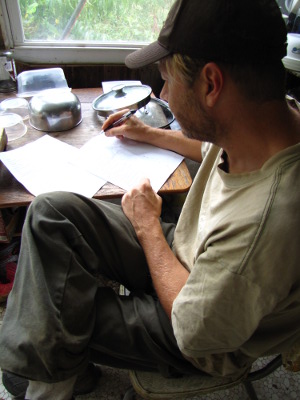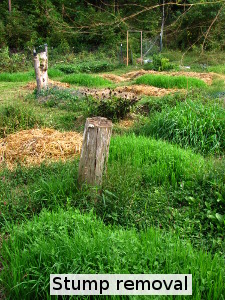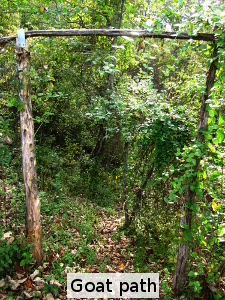
Winter 2011-2012 Goals
 Every young homesteader I
talk to has the same problem --- we put too much on our lists.
Day to day upkeep of a budding farm takes so much time that it's tough
to fit in the long term projects you dream about. No surprise
that we still haven't finished all of the projects on 2009's goal sheet, let alone on 2010's. (And that's after
making no list for 2011 in hopes of getting caught up!)
Every young homesteader I
talk to has the same problem --- we put too much on our lists.
Day to day upkeep of a budding farm takes so much time that it's tough
to fit in the long term projects you dream about. No surprise
that we still haven't finished all of the projects on 2009's goal sheet, let alone on 2010's. (And that's after
making no list for 2011 in hopes of getting caught up!)
This fall, we're trying
out a new method of deciding which goals go on the year's list.
First, I'm starting the list when we have the entire cold season ahead
of us, rather than in January when the garden will be breathing down
our throats again in just a couple of months. Next, we're
deciding how many projects go on the list by time to complete rather
than by number.
Mark and I brainstormed
all of the activities we were interested in, and then I assigned a
person-day figure to each. (One person-day is how much work Mark
or I can get done in one of our three hour work mornings or
afternoons.) Finally, Mark and I each numbered the projects from
our most favorite to our least favorite.
Since I estimate we have
about 80 people-days to devote to long term projects over the winter,
the first 40 people-day activities on each of our lists hit the goal
sheet. Knowing that anything not on the main list isn't going to
happen for at least a year made us each go back and change our answers
slightly, but then we came up with the priorities below:
- Stepping
stones across the creek. (We decided that this will be
our main footworthy creek crossing option, at least for now.)
- Finish bringing the winter waterline into the trailer. (It's buried to only five feet away!)
- Tear out the footbridge. (The structure has rotted to the point that it's definitely hazardous if anyone is dumb enough to try to walk on it.)
- Blueberry kill mulch.
(Weeds in the blueberry patch got out of control.)
- Driveway repair.
(We're thinking of sinking cinderblocks into the
most problematic spot, a bit like the way we made
the ford.)
- Two more chicken pastures and another coop. (If we raise as many broilers next year, this should help keep the pastures from getting over-grazed.)
- Floor and workbench under the front porch. (The ground outside the door is a muddy mess in the winter, and a workbench would be awfully helpful for cutting firewood to size.)
- Deer fence along the southern border. (This is our main problem spot at the moment for incursions.)
- Shelving in Anna's room for towels and sheets. (They're currently stacked from floor to ceiling.)
- Herb beds for the bees. (We'd like to put a kill mulch around each hive so that the weeds don't grow up into the flight path. While we're at it, I want to plant thyme to cut down on varroa mites.)
 Stump removal around the yard.
(This will expedite summer mowing.)
Stump removal around the yard.
(This will expedite summer mowing.)- Bathtub/bench in the front room. (A winter bath right beside the wood stove sounds nice. I figure if we make a hinged plywood top for the bathtub, it can double as a bench when guests come over.)
- Reclaim the gully. (This mass of weeds is one of Mark's least favorite parts of the yard.)
- Diversify plantings in the chicken pastures. (I'm thinking of a few more persimmons, maybe another pear, and a goumi.)
- Woodshed expansion. (Our current shed is just about chock full, and it would be nice to have room to keep a bit more firewood under cover.)
- Root cellar. (We've been itching to excavate the fridge root cellar for a while. I figure if we build a roof over the area the fridge is in, the dirt won't slump again.)
- Loft divider. (Now
that the East
Wing is mostly done, Mark wants to close off his sleeping quarters
so he can get true darkness.)
- Goat path steps.
(We have a shortcut to our house that bypasses one of the loops of the
 driveway, but it's steep and slippery and
could use some work.
driveway, but it's steep and slippery and
could use some work.

It's a long list this
year, but you'll notice that most of the projects are relatively
small. I was itching to put a summer kitchen on the list and to
prepare for goats, but the truth is that I'd rather have time for a
dozen small tasks than to put off my bathtub yet another year while
embarking on one big project. Maybe next year at this time, we
will have actually finished all of our long term projects on time for
the first year ever!
Want more in-depth information? Browse through our books.
Or explore more posts by date or by subject.
About us: Anna Hess and Mark Hamilton spent over a decade living self-sufficiently in the mountains of Virginia before moving north to start over from scratch in the foothills of Ohio. They've experimented with permaculture, no-till gardening, trailersteading, home-based microbusinesses and much more, writing about their adventures in both blogs and books.
Want to be notified when new comments are posted on this page? Click on the RSS button after you add a comment to subscribe to the comment feed, or simply check the box beside "email replies to me" while writing your comment.

If you're going to build stepping-stones out of cinderblocks, you're more than halfway to building bridge piers already. So why not add some planks and make a bridge out of it? The biggest problem with putting structures in the creek is that the water has to flow around them. Because the structures take up part of the cross section of the creek, the average flow speed between the pillars/stepping stone will be higher than at a point where there are none! This will lead to scour. A way to combat that is to put a layer of heavy stones on the creekbed around the stepping-stones/piers.
With regard to the root cellar, I don't think a roof will help much, because it cannot prevent water from flowing through the soil! It would be better to line the access cavity with either boards (might not last long) or grass turf.
And about the water line; what about using a human-powered pump? There are off-the-shelf hand-pumps and treadle pumps, but most of those are suction pumps. What you'd want to pump the water over the cailing and into a bladder is a pump with positive exhaust pressure. I'd think you could drive the water pump off a car or truck with a bicycle crankset with a big blade, putting a very small cog on the axle of the pump. Feet operated is probably best, because your legs are generally more powerful than your arms. Add a one-way valve after the pump to prevent the water from flowing back.
Unfortunately, building a bridge would mean taking two or three other things off the list, and we already had to leave things that felt pretty essential off. Honestly, I'm not even sure we need stepping stones (that was on Mark's list), but I figure they'll do the trick quite well for now.
We'll probably put the stepping stones along the edge of the ford, which will prevent scour because the ford is already paved with cinderblocks. I appreciate you mentioning that --- your description made a lot of sense!
Sounds like we need to do more thinking about the root cellar project. Good thing it's far down on the list.
Your pump ideas sound interesting, but have the same problem as the bridge --- they add more time, which means the project probably wouldn't make it onto this year's list.... The theme of the year is trying to get quick projects done without complicating them.
It helps a lot to think things through thoroughly before doing them. If you want to make/build something, make a sketch of what you want to make. Take measurements, and make a list of things that you need to make it. Think of possible pitfalls and how to avoid them. Don't start the task until you have all the required materials for it, otherwise you won't Get Things Done.
Sure you can make things up as you go along, but that tends to take longer in my experience. Especially if you have to go and hunt for stuff that you really need to finish a task.
Also, try building success for yourself into your planning by dividing tasks into smaller subtasks that you can accomplish within a day. People tendto you feel good they you can tick items off their list.
You're totally right --- I've been making lists just like that for our winter projects and trying to stock up on the supplies when the floodplain is dry enough for driving. (It sure is easier to get things done when you don't have to take a day to drive to town for the supplies and another day to haul them in...)
I haven't gotten to the things on the bottom of the winter's list, though, like the root cellar. Actually, I made my supply list before I'd realized that my overly ambitious plans for the winter were a bit nuts --- sounds like it's time for a new list and series of diagrams!
And sublists are the way I make myself happy. Mark will sometimes remind me to write something on the list just so I can check it off! (Yes, I am a very simple person....)
(Yes, I am a very simple person....)
I had a few stumps in the yard from some trees that we had to cut down. Hubby cut them as close to the ground as possible using a chain saw, and then we drilled many holes in the cut surface using a large drill bit. The stumps rotted out on their own within a year.
BTW, my Egyptian walking onions are doing great. Thank you again!
I think our stump removal is going to be even simpler --- cut to the ground and ignore. We cut the trees down about six years ago, so all except one or two have finally stopped sending up shoots, but the stumps are still making mowing difficult. (The organic matter starting to be made by the rotting roots, though, is very good for the adjacent raised beds!) This is one of the easiest things on the list, and just writing about it makes me want to do it first so that I can mark something off.
I'm so glad to hear your Egyptian onions are thriving!
For some reason it's more fun to find solutions to the things on your list than the things on ours.
When I read about your driveway it made me think of something that may be helpful. Around here we have huge swamps and wetland. Many of logging roads and fire lanes are what we call corduroy roads. In the low areas logs were laid lengthwise across the road right next to each other. Over the years they have added fill or gravel over top of them. I don't know if it would work for you or not.
Justin --- My mom suggested the same thing (based on reading books about the Civil War in her case.) I think it's a fun idea, but not very practical for our farm. From my understanding of corduroy roads, they take a lot of manpower to build, and then you have to contend with the fact that the logs start to rot pretty fast and you end up with a road full of good potting soil but not very good traction. If we had no cash and unlimited time, I'd say they'd be a good option, but I'd rather spend a little bit of money on cinder blocks that will last decades and save us a lot of time in the long run.
Fritz --- We've had a similar experience, but Mark was able to take some of the stumps out this year with his bare hands! You're totally right that it's the ones that the fungi worked on which were able to be pushed over. Actually, I think he took out about half of our stumps this year with just a bit of elbow grease (and the occasional use of the spud bar.)